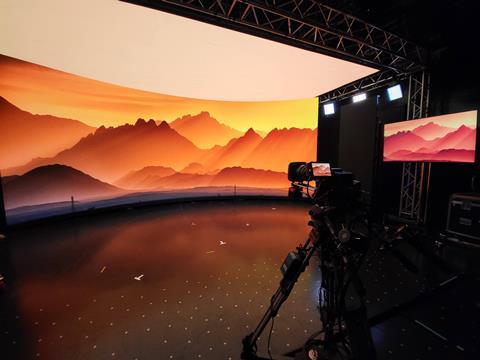It received funding from the Department of Education to create the studio, which will help plug the industry-wide skills gap

The London Academy of Music and Dramatic Art (LAMDA) is set to open a state-of-the-art virtual production (VP) studio, enabling students to gain hands-on experience in this burgeoning technology.
The organisation received almost £2million in funding from the Department of Education to enable it to create the new facility.
LAMDA is the oldest drama school in the UK, having been founded in 1861. Its president is Benedict Cumberbatch. It plans to open the studios and offer virtual production courses to students by the end of the year.
Virtual production merges physical and virtual filmmaking. LAMDA’s studio features a 9 x 3.5 metre virtual production LED wall background where production teams can create versions of scenes using computer generated imagery, for actors to act in front of.
To deal with the skills gap in VP and mocap, LAMDA is set to introduce a new FdA (Foundation Degree in Education) course in Creative Virtual Production Management, an MA (Master of Arts) course in Production Management for Screen, Audio & Virtual Production and academic credit-earning evening courses, in specialised digital skills which could eventually lead to a degree. LAMDA will also run a number of CPD (continuous professional development) courses in these emerging technologies.
Film director Joe Russo (You, Me and Dupree and the Avengers movies) said: “It’s exhilarating to see LAMDA stepping into the VP space. I don’t know any other drama school that is thinking about virtual production in the way that LAMDA is. This is a hugely creative endeavor and shows real forward-thinking ambition. By making unaffordable technology accessible, they will open up the playing field to new storytellers. It’s an exciting time to be part of LAMDA.”
Principal and chief executive of LAMDA, professor Mark O’Thomas, added: “This is a substantial investment into LAMDA’s screen skills component and future-proofs the learning environment for changing industry needs. It ensures our students emerge from training being ‘set ready’ in a range of technologies, and technicians enter the work arena with the right skills, knowledge, and experience to meet future demand.
“We plan to use the funds for film, TV and storytelling and provide education all round, from preparing actors to act in a VP setting as well as the technical aspects for VP management. VP and mocap are becoming more and more widely used by TV and film studios, which is also advancing at such a pace that skilled employees are difficult to recruit.
“The capital grants allow LAMDA to provide students with niche, relevant and up-to-date skills that even most industry professionals would not have. It exposes students to the latest screen technology uses while addressing the growing skills gap in screens and film industry. We can also upskill professionals who are already in the industry.”





























No comments yet